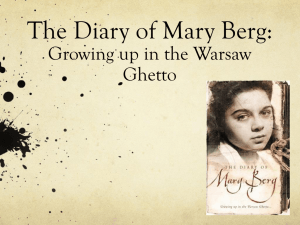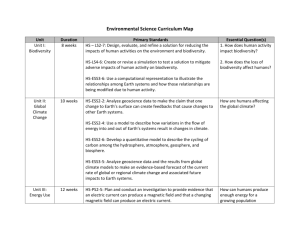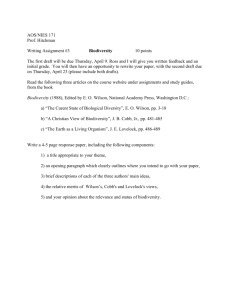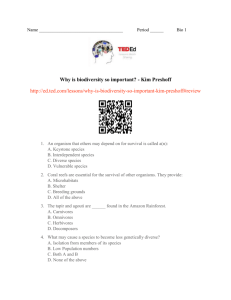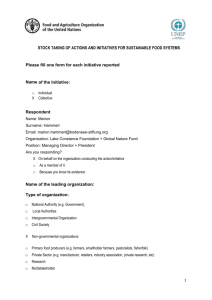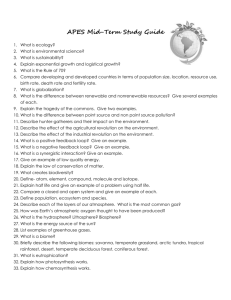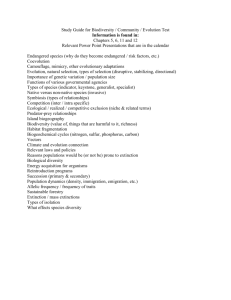Biodiversity Conservation Bank in France
advertisement
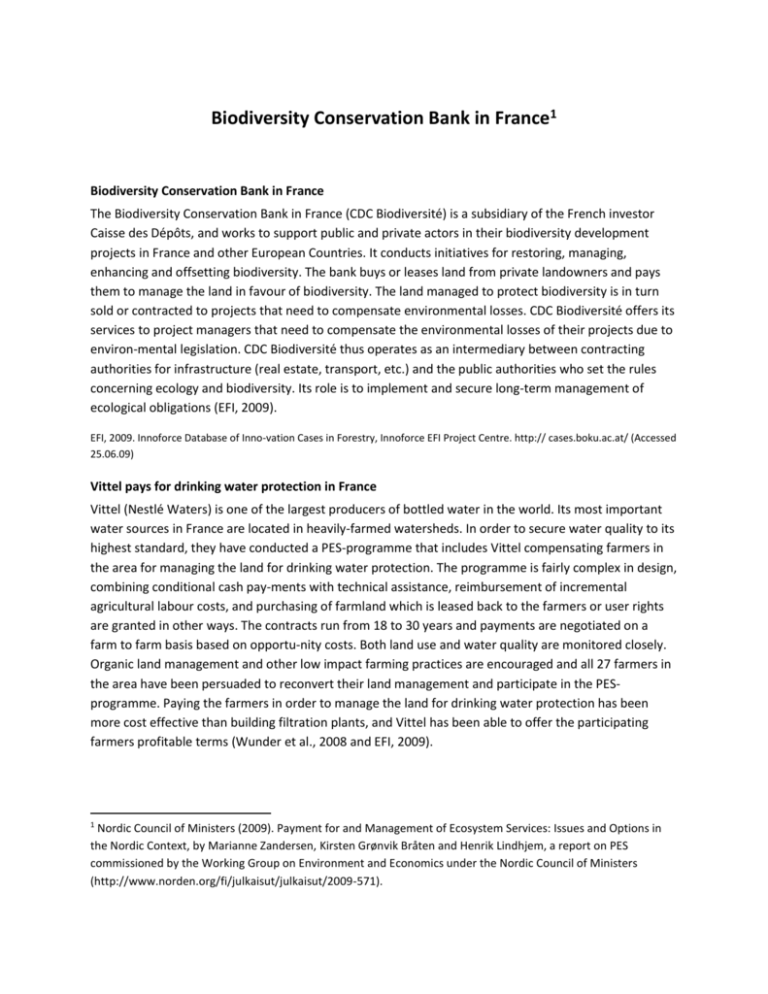
Biodiversity Conservation Bank in France1 Biodiversity Conservation Bank in France The Biodiversity Conservation Bank in France (CDC Biodiversité) is a subsidiary of the French investor Caisse des Dépôts, and works to support public and private actors in their biodiversity development projects in France and other European Countries. It conducts initiatives for restoring, managing, enhancing and offsetting biodiversity. The bank buys or leases land from private landowners and pays them to manage the land in favour of biodiversity. The land managed to protect biodiversity is in turn sold or contracted to projects that need to compensate environmental losses. CDC Biodiversité offers its services to project managers that need to compensate the environmental losses of their projects due to environ-mental legislation. CDC Biodiversité thus operates as an intermediary between contracting authorities for infrastructure (real estate, transport, etc.) and the public authorities who set the rules concerning ecology and biodiversity. Its role is to implement and secure long-term management of ecological obligations (EFI, 2009). EFI, 2009. Innoforce Database of Inno-vation Cases in Forestry, Innoforce EFI Project Centre. http:// cases.boku.ac.at/ (Accessed 25.06.09) Vittel pays for drinking water protection in France Vittel (Nestlé Waters) is one of the largest producers of bottled water in the world. Its most important water sources in France are located in heavily-farmed watersheds. In order to secure water quality to its highest standard, they have conducted a PES-programme that includes Vittel compensating farmers in the area for managing the land for drinking water protection. The programme is fairly complex in design, combining conditional cash pay-ments with technical assistance, reimbursement of incremental agricultural labour costs, and purchasing of farmland which is leased back to the farmers or user rights are granted in other ways. The contracts run from 18 to 30 years and payments are negotiated on a farm to farm basis based on opportu-nity costs. Both land use and water quality are monitored closely. Organic land management and other low impact farming practices are encouraged and all 27 farmers in the area have been persuaded to reconvert their land management and participate in the PESprogramme. Paying the farmers in order to manage the land for drinking water protection has been more cost effective than building filtration plants, and Vittel has been able to offer the participating farmers profitable terms (Wunder et al., 2008 and EFI, 2009). 1 Nordic Council of Ministers (2009). Payment for and Management of Ecosystem Services: Issues and Options in the Nordic Context, by Marianne Zandersen, Kirsten Grønvik Bråten and Henrik Lindhjem, a report on PES commissioned by the Working Group on Environment and Economics under the Nordic Council of Ministers (http://www.norden.org/fi/julkaisut/julkaisut/2009-571). EU2 (2011) The French Vittel Company’s case: a voluntary and bilateral PES, involving private finance Maybe one of the oldest cases quoted by the literature, the case of Vittel is somehow symbolic of the PES concept. At the end of 1980s, Vittel (a French company selling natural mineral water) noticed threats on water nitrates and pesticides rates while it had to remain exempt from any treatment to keep its natural mineral water qualification. The private company then launched an agricultural improvement program on the 5000 ha catchments area of the springs exploited. The objective was to reach a 10 mg / l rate of nitrates (against about 40 mg / l at this time), and 0 pesticides in the water. Within this program framework, Vittel bought the majority of farmlands and exploitation rights of lands located where mineral water is collected. Vittel then gave these lands, free of charge, to interested farmers at some good practice conditions. These condition where elaborated by the French agronomic research institute (INRA). Beyond this, Vittel pays 228 Euros per ha and per year to each farmer for a 7-years period, via AGRIVAIR, an intermediary specially created for this. AGRIVAIR also supplies free services to farmers (technical advice on excrement composting for example). The length of farmers’ commitment is of 18 or 30 years. The program has cost Vittel the equivalent of 0, 15 centime of Euro by litre, for an expense of about 15 M€. (Perrot-Maître, 2006; INRA, 1997) Vittel is often described as an example of a cost-effective solution. It is interesting to note that it is a private and almost bilateral initiative, with direct contract-based links between the company, which buys a practice corresponding to its interests, and the farmer, who "sells" this practice. 2 European Union (2011). EU submission of information concerning innovative financial mechanisms, pursuant to decision X/3, A, paragraph 8(c), 29 June 2011
